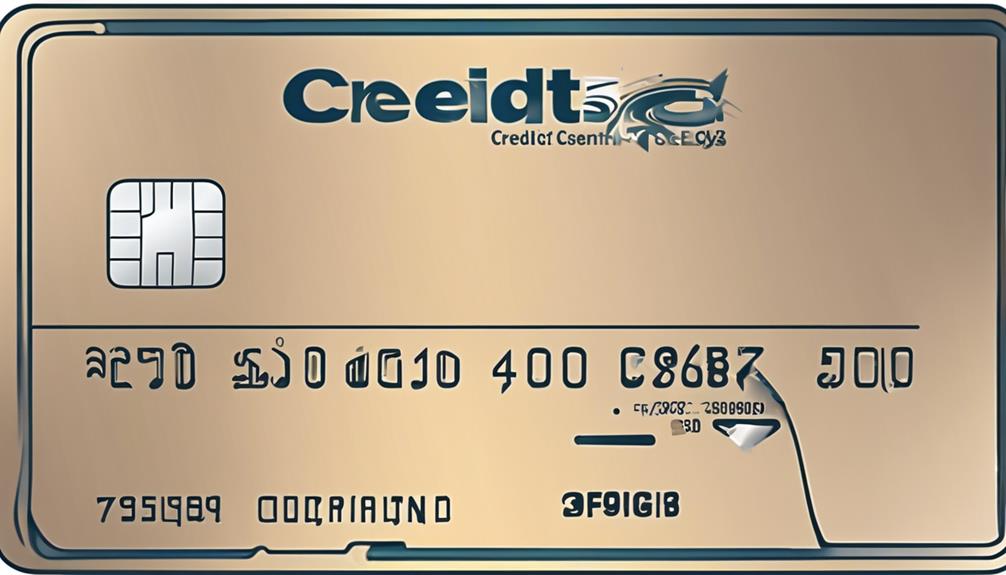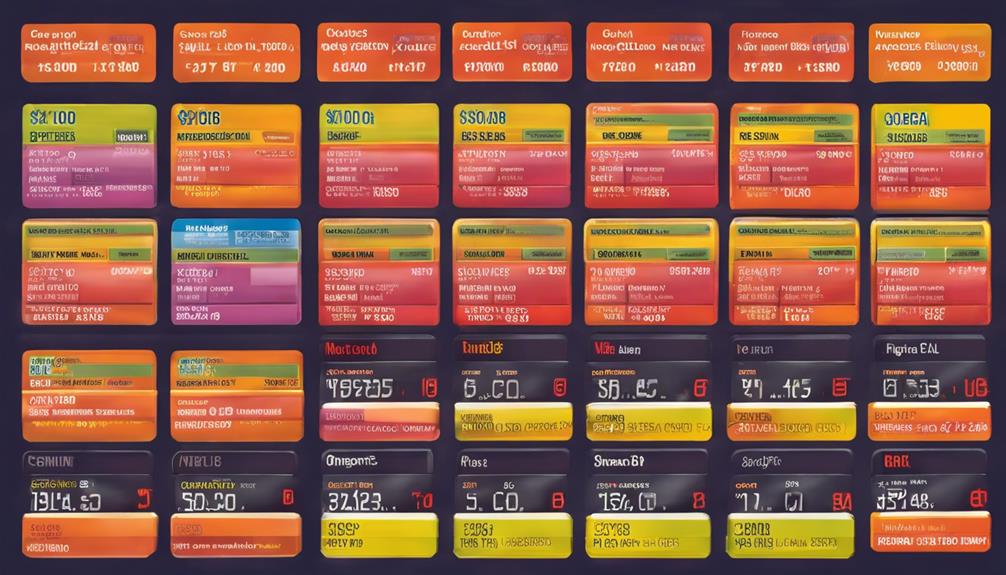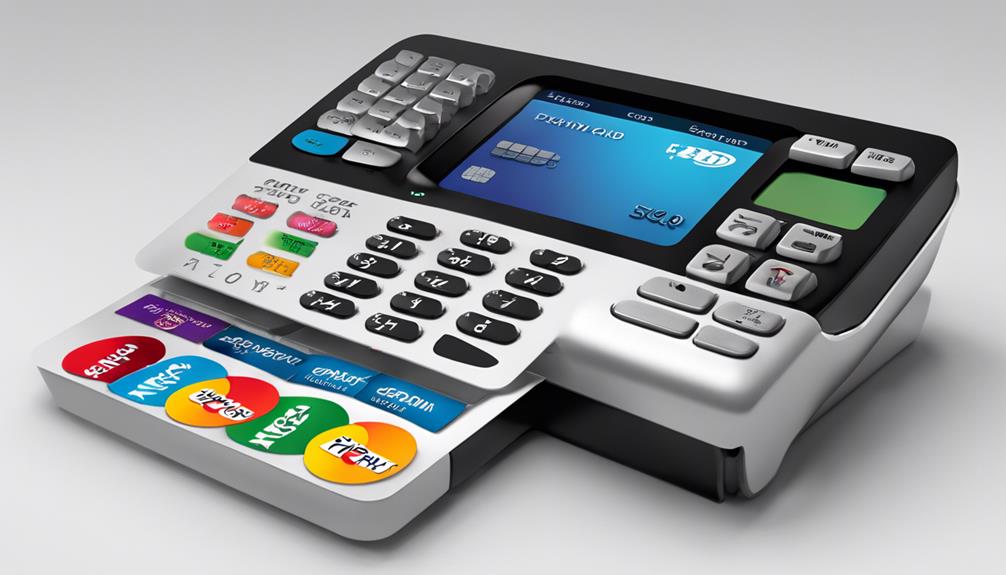When it comes to credit card processing and merchant account services, there are various common charges to consider. These include interchange fees, which are influenced by the type of card and industry, assessment fees based on monthly sales volume, and payment processing fees that encompass fixed and network costs. Interchange fees typically range from 1.15% to 3.15% along with fixed transaction fees, while assessment fees can vary depending on the card network. Assessment fees from major credit card companies like Visa, Mastercard, Discover, and American Express are crucial factors to consider. Managing these charges requires awareness of additional fees such as chargebacks and termination fees, as well as pricing markups. Mastering these concepts is essential for effectively handling credit card processing expenses.
Key Takeaways
- Interchange fees are essential, varying based on card type and transaction amount.
- Assessment fees are imposed by credit card networks, not per transaction.
- Payment processing fees include fixed transaction fees and monthly charges.
- Visa, Mastercard, Discover, and American Express charge assessment fees.
- Hidden fees like chargeback fees and termination fees can add to processing costs.
Understanding Interchange Fees
When we explore the domain of credit card processing costs, understanding interchange fees becomes essential. Interchange fees are essential payments to the card-issuing bank for processing card transactions. These fees aren't fixed; they vary depending on factors such as the type of card used, transaction amount, and the industry involved. Importantly, online transactions incur higher interchange fees due to increased fraud risks associated with them.
Interchange fees play an important role in determining overall credit card processing fees, greatly impacting a business's costs. It's imperative for businesses to comprehend that their practices can influence these fees. By managing interchange fees effectively, businesses can optimize their financial performance and minimize unnecessary expenses. As such, understanding the nuances of interchange fees, including how they're calculated and the factors that influence them, is essential for any business seeking to streamline its credit card processing costs.
Overview of Assessment Fees

Moving from our exploration of interchange fees, let's now shift our focus to the overview of assessment fees in the domain of credit card processing costs. Assessment fees are charges imposed by credit card networks such as Visa, Mastercard, Discover, and American Express for card usage. These fees are calculated based on a percentage of the monthly sales volume and are not applied per transaction. By combining assessment fees with interchange fees, the total swipe fee for each transaction is determined. For instance, Visa typically charges around 0.14% of the transaction amount as an assessment fee, while American Express tends to have the highest assessment fee among payment networks, usually around 0.17% of the transaction amount.
| Credit Card Network | Assessment Fee Percentage |
|---|---|
| Visa | 0.14% |
| Mastercard | To be determined |
| Discover | To be determined |
| American Express | 0.17% |
Exploring Payment Processing Fees
Let's explore the world of payment processing fees, shedding light on the costs businesses incur to facilitate credit card transactions efficiently. Interchange fees typically range from 1.15% to 3.15%, along with a fixed transaction fee. These fees vary based on factors like card type, transaction amount, and industry.
Assessment fees, such as Visa's 0.14% fee, are imposed by credit card networks for card usage and are combined with interchange fees to determine the total swipe fee. Payment processor fees play an important role in a business's processing costs, including monthly fees between $9.95 to $20, and per-transaction fees ranging from 0.18% to 0.50% plus a fixed amount.
Different credit card networks like Mastercard and American Express have their own assessment fees, with American Express having the highest at 0.17%. Understanding these fees is essential for businesses to effectively manage their credit card processing expenses and enhance profitability.
Impact of Credit Card Company Assessment Fees

Assessment fees from credit card companies greatly impact businesses' overall profitability, serving as essential components of credit card processing costs. These fees, charged by major payment networks like Visa, Mastercard, Discover, and American Express, play a significant role in determining the total expense incurred by businesses for processing credit card transactions. Here's how these assessment fees can impact businesses:
- Visa Assessment Fee: Typically around 0.14% of the transaction amount.
- Mastercard Assessment Fee: 0.13% for transactions under $1,000 and 0.14% for transactions over $1,000.
- Discover Assessment Fee: Set at 0.13% of the transaction value.
- American Express Assessment Fee: The highest among major payment networks, at 0.17.
Understanding these assessment fees is crucial for businesses to accurately calculate their credit card processing costs and assess the impact on their overall profitability. By being aware of these fees, businesses can make informed decisions to optimize their financial strategies.
Managing Hidden Fees and Markups
Let's shed light on hidden fees and pricing markups to help you manage your credit card processing costs more effectively.
By understanding these additional charges, we can make informed decisions to protect our business finances.
Being aware of the various fees involved guarantees we can navigate the merchant account landscape with confidence.
Uncovering Hidden Fees
Revealing hidden fees in credit card processing and merchant accounts is essential for managing costs effectively and avoiding unexpected charges that impact profitability. Here are some common hidden fees to watch out for:
- Chargeback fees can range from $20 to $100 per disputed transaction, impacting merchants' bottom line.
- Retrieval request fees are charged for providing transaction details upon request, adding to processing costs.
- Termination fees apply if a merchant cancels their account early, preventing contract exits without penalties.
- PCI compliance fees are necessary for maintaining data security standards, with additional charges for compliance services.
Being aware of these fees helps businesses navigate the complex world of credit card processing and merchant services more effectively.
Understanding Pricing Markups
Exploring the world of credit card processing and merchant accounts involves understanding pricing markups to effectively manage hidden fees and markups that can impact business profitability.
When delving into the domain of credit card transactions, it's imperative to grasp the various fees that can be incurred. These may include interchange fees, assessment fees, credit card surcharges, and monthly minimum fees. Interchange fees are charges from the card-issuing bank, while assessment fees are set by the card networks. Credit card surcharges are additional fees passed on to the customer for using a credit card. Monthly minimum fees guarantee a baseline processing fee is met each month.
Importance of Wholesale Pricing Model

Utilizing a wholesale pricing model in credit card processing is vital for small businesses aiming to save money and maintain cost predictability. Payment Depot, for example, employs this model by charging a fixed monthly fee rather than transaction percentages. Here's why the wholesale pricing model is essential:
- Cost Savings: Small businesses benefit from saving money as wholesale pricing eliminates percentage-based charges.
- Predictability and Transparency: This model offers predictability and transparency in credit card processing costs, providing businesses with a clear understanding of their expenses.
- Consistent Fees: Merchants enjoy consistent monthly fees without fluctuations based on transaction volume, ensuring stable financial planning.
- Ideal for Varying Transaction Sizes: The wholesale pricing model is particularly suitable for businesses with varying transaction sizes, offering cost-effective solutions regardless of transaction volume fluctuations.
Frequently Asked Questions
What Are Typical Merchant Processing Fees?
Merchant processing fees typically range from 1.3% to 3.5%, depending on the card type and transaction. Debit cards usually have lower fees compared to credit cards.
Visa's assessment fee is around 0.14%, while Mastercard's varies from 0.13% to 0.14% based on transaction amount. American Express charges the highest assessment fee among major networks at about 0.17%.
Each card company has its own fee structure that impacts merchant costs.
What Fees Are Usually Behind the Merchant Service Charge?
When examining merchant service charges, it's crucial to take into account interchange fees, assessment fees, and payment processor fees. These fees are the usual suspects behind the final merchant service charge.
Interchange fees benefit the card-issuing bank, assessment fees go to card networks, and processor fees cover transaction processing costs. Understanding these components helps us grasp the breakdown of charges in credit card processing.
What Is a Common Fee Associated With Credit Cards?
Interchange fees are a common charge associated with credit card processing, paid to the card issuer for each transaction. Assessment fees are another typical charge linked to credit cards, paid to the card network for card usage.
Payment processor fees are a standard fee associated with credit card processing, charged by the merchant services processor for transaction processing. American Express fees are notable here, as they've higher assessment fees compared to other card networks.
These fees collectively impact a business's overall credit card processing costs and profitability.
What Are the Merchant Transaction Fees for Credit Cards?
Merchant transaction fees for credit cards encompass several components. Interchange fees range from 1.15% to 3.15% per transaction, with processor markups adding 0.05% to 0.5%. Additional assessment fees, such as Visa's average 0.11% per transaction, further impact costs. American Express may impose higher transaction fees than other networks, affecting overall processing expenses.
Understanding the total fee structure is crucial for assessing a business's financial health. The fee comprises interchange, processor, and assessment fees, making it essential to analyze each component to manage costs effectively.
Conclusion
In summary, understanding the various charges associated with credit card processing and merchant account services is vital for businesses.
By being aware of interchange fees, assessment fees, payment processing fees, and hidden markups, businesses can better manage their finances and make informed decisions.
It's important to be vigilant in monitoring costs and seeking out wholesale pricing models to guarantee transparency and efficiency in payment processing.
Stay informed and stay ahead in the world of credit card transactions.









